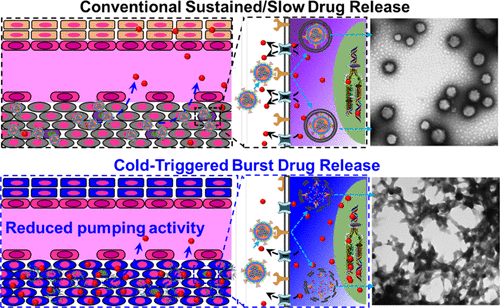当前位置:
X-MOL 学术
›
ACS Cent. Sci.
›
论文详情
Our official English website, www.x-mol.net, welcomes your
feedback! (Note: you will need to create a separate account there.)
Overcoming Ovarian Cancer Drug Resistance with a Cold Responsive Nanomaterial
ACS Central Science ( IF 12.7 ) Pub Date : 2018-04-17 00:00:00 , DOI: 10.1021/acscentsci.8b00050 Hai Wang 1, 2, 2 , Pranay Agarwal 2, 2 , Gang Zhao 3 , Guang Ji 4 , Christopher M Jewell 1, 1, 5, 6, 7 , John P Fisher 1 , Xiongbin Lu 8 , Xiaoming He 1, 1, 2, 2, 5
ACS Central Science ( IF 12.7 ) Pub Date : 2018-04-17 00:00:00 , DOI: 10.1021/acscentsci.8b00050 Hai Wang 1, 2, 2 , Pranay Agarwal 2, 2 , Gang Zhao 3 , Guang Ji 4 , Christopher M Jewell 1, 1, 5, 6, 7 , John P Fisher 1 , Xiongbin Lu 8 , Xiaoming He 1, 1, 2, 2, 5
Affiliation

|
Drug resistance due to overexpression of membrane transporters in cancer cells and the existence of cancer stem cells (CSCs) is a major hurdle to effective and safe cancer chemotherapy. Nanoparticles have been explored to overcome cancer drug resistance. However, drug slowly released from nanoparticles can still be efficiently pumped out of drug-resistant cells. Here, a hybrid nanoparticle of phospholipid and polymers is developed to achieve cold-triggered burst release of encapsulated drug. With ice cooling to below ∼12 °C for both burst drug release and reduced membrane transporter activity, binding of the drug with its target in drug-resistant cells is evident, while it is minimal in the cells kept at 37 °C. Moreover, targeted drug delivery with the cold-responsive nanoparticles in combination with ice cooling not only can effectively kill drug-resistant ovarian cancer cells and their CSCs in vitro but also destroy both subcutaneous and orthotopic ovarian tumors in vivo with no evident systemic toxicity.
中文翻译:

用冷响应纳米材料克服卵巢癌耐药性
由于癌细胞中膜转运蛋白的过度表达和癌症干细胞 (CSC) 的存在而导致的耐药性是有效和安全的癌症化疗的主要障碍。已经探索了纳米颗粒来克服癌症耐药性。然而,从纳米颗粒中缓慢释放的药物仍然可以有效地从耐药细胞中泵出。在这里,开发了一种磷脂和聚合物的混合纳米颗粒,以实现封装药物的冷触发爆发释放。随着冰冷却至 ~12 °C 以下,药物释放和膜转运蛋白活性降低,药物与其靶标在耐药细胞中的结合是显而易见的,而在保持在 37 °C 的细胞中它是最小的。而且,在体外但也在体内破坏皮下和原位卵巢肿瘤,没有明显的全身毒性。
更新日期:2018-04-17
中文翻译:

用冷响应纳米材料克服卵巢癌耐药性
由于癌细胞中膜转运蛋白的过度表达和癌症干细胞 (CSC) 的存在而导致的耐药性是有效和安全的癌症化疗的主要障碍。已经探索了纳米颗粒来克服癌症耐药性。然而,从纳米颗粒中缓慢释放的药物仍然可以有效地从耐药细胞中泵出。在这里,开发了一种磷脂和聚合物的混合纳米颗粒,以实现封装药物的冷触发爆发释放。随着冰冷却至 ~12 °C 以下,药物释放和膜转运蛋白活性降低,药物与其靶标在耐药细胞中的结合是显而易见的,而在保持在 37 °C 的细胞中它是最小的。而且,在体外但也在体内破坏皮下和原位卵巢肿瘤,没有明显的全身毒性。











































 京公网安备 11010802027423号
京公网安备 11010802027423号